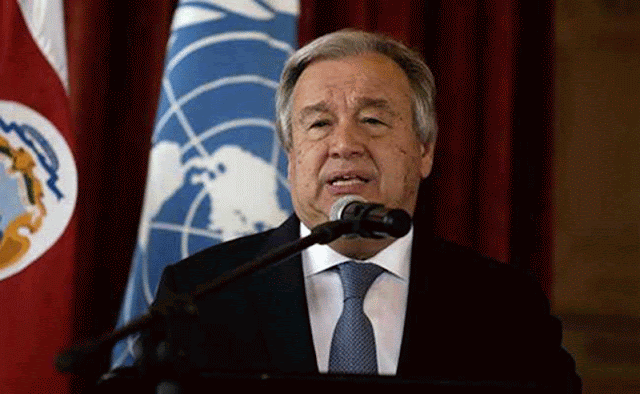By Edward Carney
The Secretary General of the United Nations has released his latest report on the situation of human rights in the Islamic Republic, and the
Center for Human Rights in Iran published excerpts of that report on Tuesday, ahead of its presentation to the UN General Assembly in New York.
The report gives credit to Tehran for engaging with the international community and taking “positive steps” such as a revision in drug laws that reduced the frequency of the death penalty for non-violent offenses.
But the main substance of the report is a catalogue of familiar human rights abuses that have not been addressed, followed by associated recommendations for changes in the behavior of the Iranian regime.
Notwithstanding the Secretary General’s more optimistic remarks, there is no real indication that the regime will be more responsive to these recommendations that it has been on any of the prior instances in which they were brought up in the context of previous reports from the Secretary General, the UN special rapporteur on human rights in Iran, and others.
Indeed, with respect to a number of human rights issues, the regime has struck a defiant tone in dialogue with the international community. And regardless of recent changes in drug laws, the death penalty ranks high among these issues.
On Sunday, the
Iran Human Rights website reported upon the latest instance of the Iranian judiciary refusing to abide by the changes in its own laws when it carried out the execution of another person who had been convicted of drug trafficking without any violent offense.
The report points out that at least three other such individuals have been put to death since the change took effect last November. It should also be noted that there could be others besides, since executions frequently go unreported by Iranian authorities and are added to the record of killings only later, after activists and fellow prisoners reveal the information to independent monitors.
Nevertheless, it does appear to be the case that the number of drug-related executions has sharply declined in the past year. Yet this is only one part of the Iranian regime’s relationship with the death penalty that has traditionally opened it up to international criticism.
The persistent execution of juvenile offenders is another and it involves disregard for international human rights conventions to which Iran is a signatory. On this point, the regime has shown no inclination toward compromise, and the latest figures suggest that the number of these killings may actually be on the rise.
According to
another Iran Human Rights report, at least five Iranian prisoners were executed in 2017 for crimes that had allegedly committed when they were below the age of 18. This year, at least three such individuals were executed in the month of January alone.
And apart from implementing juvenile death sentences that have been imposed in years past, the Iranian judiciary also continues to pass more such sentences, even in the face of wide-ranging international condemnation and activism.
Most recently, an individual identified only as Mehrdad had his sentence revised up by the Criminal Court of Tehran, which imposed the death sentence in place of a sentence of imprisonment and the payment of blood money for the 2014 murder of a fellow teenager whom Mehrdad accused of sexually assaulting him.
This represents a trend in the exact opposite direction as the international community has sought to push the Islamic Republic in the past. At various times, the judiciary has delayed the execution of juvenile offenders and ordered the reexamination of the case under international pressure, but in almost every case the courts then upheld the sentence and affirmed their right to impose the ultimate sentence on anyone who is deemed sufficiently mature. Under Iranian law, such a person may be as young as nine.
The latest executions and death sentences stand out as qualifications to the “positive steps” highlighted by the United Nations. Meanwhile, the Secretary General’s report goes a long way on its own toward downplaying that praise, insofar as it acknowledges that the Islamic Republic is in the midst of a severe crackdown on dissent, accompanied by human rights violations and a sharp increase in censorship.
There is no shortage of media reports to highlight this trend, which has certainly been ongoing since the mass uprising that took place in late December and early January, and arguably ever since the election of President Hassan Rouhani and the start of nuclear negotiations between Iran and six world powers.
According to the National Council of Resistance of Iran, security forces arrested upwards of 8,000 peaceful protesters in the midst of the mass uprising, as well as shooting approximately 50 dead in the streets and allowing a dozen others to die under torturous interrogation.
Anti-government protests have continued in spite of this repression, but the repression itself has also broadened to include known activists who may not have personally participated in the initial uprising.
On Tuesday,
Iran Human Rights Monitor reported that Soha Mortezaie, the Secretary of the Central Guild Council at Tehran University, had been sentenced to six years in prison plus a two year ban on political activities simply for inquiring after the status of student protesters who were arrested in the midst of the nationwide demonstrations.
The same report identified 21 such students who have already been sentenced for protesting. Their sentences range from one year to a staggering 12 years in prison, and numerous other prisoners remain either in jail or free on bail pending their own sentencing for the same activities.
While the uprising was in full swing, judiciary officials publicly warned that those who were identified as leaders of the protest movement could be subject to the death penalty.




Comments
Post a Comment